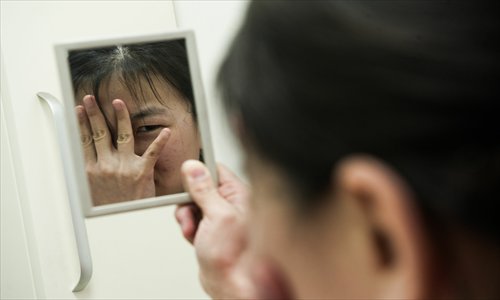
People who irrationally hate their physical appearance may suffer from body dismorphic disorder. (Photo: GT/Li Hao)
What you see in the mirror may be the result of a psychological condition
Even after her second micro-plastic injection to remove her double chin in March, 22-year-old Tian Yuan (pseudonym) still does not feel satisfied with her appearance. It has been two years since she first began to think there was something wrong with her facial features and the way her body looked.
Tian owns a small boutique with clothes and Japanese manga-related products in Beijing's Haidian district and used to occasionally do cosplay for fun and money. However, two years ago when she was paid to be a showgirl for a restaurant opening ceremony, a customer told her she was ugly, destroying her confidence, she said.
"I was said to be 'uglier than my photo',"Tian said. "The restaurant owner let me do the job, but said next time they would hire me only when my face became as beautiful as my processed photo."
However, when Tian approached a plastic surgeon about making her eyes bigger via a canthoplasty procedure in July, 2014, the surgeon denied her and told Tian her eyes were big enough. The same surgeon even said Tian's double chin was hardly noticeable when she went a second time, but she insisted on having the injection anyway.
According to a recent report in The American Journal of Psychiatry, the irrational dislike for all or part of one's physical appearance, has been found in thousands of Americans. The report calls this phenomenon "imagined ugliness syndrome."
With photo processing technology and photo beautifying apps like Meitu Xiuxiu and Camera360 popular among young people, the contrast between overly beautified photos and real appearances is more striking for most people with imagined ugliness syndrome like Tian. She said she only wanted to look at her photos instead of herself in the mirror because what she saw in the mirror was more unattractive.
"I am going to beautify my face step by step until I do not need to process portrait of myself or use any photo beautifying apps," Tian said.
Song Zhenzhu, a psychiatrist at Qiqihar No.1 Hospital in Heilongjiang Province, said the condition is known as "body dismorphic disorder" (BDD) in psychiatry.
"Often such patients are characterized by their obsession with an imagined flaw such as small eyes, a fat face, large nose and mouth, or an obese figure," Song said.
Basic symptoms may only mean frequent mirror checking, decreasing confidence, and light depression, but if left untreated, it may deteriorate and cause many serious problems such as severe depression, suicidal tendencies, social phobia, and anorexia, Song said.
Song said the reasons behind BDD are not yet clear among the psychiatric community, but it is most likely caused by psychological factors and personal experiences like sneers and stares from others, traumatic experiences like sexual abuse and domestic violence, and even an inadvertent joke may trigger the disorder.
Song said there were two ways to treat the disorder: medication and cognitive-behavioral therapy.
"It is said the disorder is caused by the decrease of serotonin, an inhibitory neurotransmitter in the human brain, which can lead to anxiety and depression," said Song, pointing out that the disorder can be treated by certain medications effective in treating depression and obsessive-compulsive disorder.
Cognitive-behavioral therapy includes exposure therapy, which helps patients get used to and accept their physical appearance through habituation, and "anxiety relief," which helps patients view themselves in a positive way and stop implementing compulsive behaviors such as going overboard with plastic surgeries.
However, Song pointed out that only few people with imagined ugliness syndrome suffer from serious mental illness.
"You think you're ugly and everyone looks at you, which is why the spotlight effect exists," Song said. "No one's perfect and no one is really ugly."
















































